Book Reviews (2014) by Joseph M. Sherlock
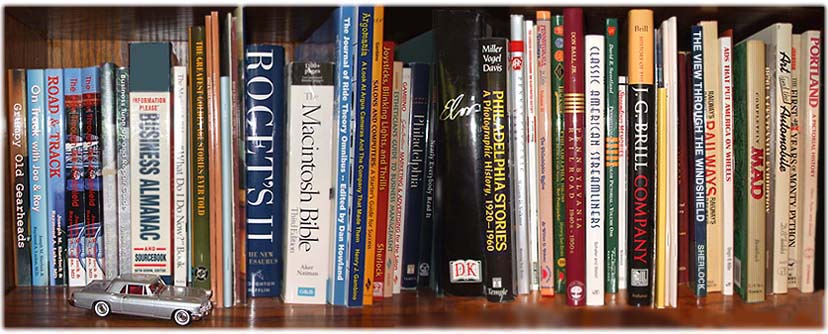
More recent book reviews can be found here.
'But Enough About You: Essays' by Christopher Buckley
This is a collection of essays written by the author over the last 20 or so years. All have been previously published, mostly in magazines. I had not read most of them, so this was a 'new' book for me.
Son of the legendary William F. Buckley, Christopher writes in the style of political humorists such as P.J. O'Rourke. But P.J. is funnier and more consistent. While I enjoyed some of Buckley's essays, chapters were hit-or-miss with me. Some chapters were nothing but book reviews or fluffed-out obituaries. The late Mr. Rogers, whose obituary is not contained in Buckley's book, might have asked, "Can you say 'scraping the bottom of the barrel'?"
There's some witty treasure here but you have to poke around the boring parts to find it.
Verdict: Meh. (posted 12/29/14, permalink)
'The Invisible Bridge: The Fall of Nixon and the Rise of Reagan' by Rick Perlstein
This is a sad and dreary chronicle of the 1970s. In this downer of a book, the author paints the era as if it were America's Hell Decade. I lived in the 1970s; it wasn't all that bad. Yes, there was Watergate and the Downfall of Nixon but we had a successful transfer of a regime without military troops or gunfire. Gas rationing in 1974 sucked but then, so did disco music. And Nixon's price-controls. And Carter's malaise speech. The economy was lackluster but there was no wholesale closing of businesses.
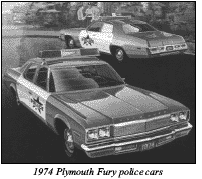 The big-bumpered cars of the mid-1970s were mostly ugly and the primitive pollution controls made them run horribly, especially when started cold. I spent many a chilly morning, sitting in a rented Dodge or Mercury with ice-cold vinyl seats, waiting for the engine to warm up enough that I could make a left exit from a Ramada Inn without stalling and getting killed by an oncoming delivery truck. Or a Plymouth Fury police car. The big-bumpered cars of the mid-1970s were mostly ugly and the primitive pollution controls made them run horribly, especially when started cold. I spent many a chilly morning, sitting in a rented Dodge or Mercury with ice-cold vinyl seats, waiting for the engine to warm up enough that I could make a left exit from a Ramada Inn without stalling and getting killed by an oncoming delivery truck. Or a Plymouth Fury police car.
But, aside from all that, things were pretty good in those bad old days. I kept my job and so did almost all my friends. People were still dining out; it was often tough to get a table on weekends. The stock market was pretty flat during the decade but no one was jumping out of windows. And I think the Bee Gees would have considered it a very good decade indeed.
I soon grew weary of reading Perlstein's liberal screeds against Nixon and Reagan. Tricky Dicky was a flawed, morally-compromised individual but history now judges him with less rancor than his liberal predecessor, Lyndon Johnson. In the author's world, Ronald Reagan was a stupid cowboy; it turned out that this ex-actor became one of the best presidents of the 20th century.
Having lived during this period of history and having been politically aware back in those days, I know the author is waaaay off-base on numerous details as well as the overall grim picture he paints.
Verdict: In the spirit of trying to find something good in every book, I confess that we had some loose carpeting that I glued down recently. This heavy book made a good weight while the glue was drying. (posted 12/17/14, permalink)
'Inventing Freedom: How the English-Speaking Peoples Made the Modern World' by Daniel Hannan
This book is an ambitious and comprehensive account of the origin and growth of the basic principles of freedom enjoyed by English-speaking countries. Freedom and individual rights grew as a result of a series of landmark documents, from the Magna Carta to the U.S. Constitution.
English-speaking peoples created and maintained democratic government: freedom of speech, government by consent of the people and basic right of private property.
Author, blogger and British member of the European Parliament, Mr. Hannan believes that Continental Europeans have never valued representative government and personal liberty in the way the English have for more than a millennium.
Sadly, we are seeing those freedom-loving ideas abandoned and scorned in the places where they once went unchallenged. His belief that Barack Obama, the current occupant of the White House, is unsympathetic to the Anglosphere and almost hostile to England rings true.
This is a very informative book. It is not a page-turner and bogs down in spots but I learned much from it. Recommended. (posted 12/10/14, permalink)
'Economics: The User's Guide' by Ha-Joon Chang
They say that economics is the Dismal Science. It has also been called the Boring Science. I believe it; I began losing interest about halfway through this book.
Cambridge economist Chang has tried to write an economics book for the layman. The chapters are short and there are attempts at levity, some successful. He reviews various types of economic theories, opining about the strengths and weaknesses of each.
Instead of Chang's book, I'd recommend these alternatives: Gilder's 'Wealth And Poverty: A New Edition For The 21st Century'. Or Sowell's 'Applied Economics: Thinking Beyond Stage One'. (posted 12/4/14, permalink)
'Please Stop Helping Us: How Liberals Make It Harder for Blacks to Succeed' by Jason L Riley
Mr. Riley is an editorial board member of the Wall Street Journal, where he has worked since 1994, and a Fox News contributor. His easy-to-read, 184-page book examines how "well-intentioned" government programs (affirmative action, welfare, soft-on-crime laws, school choice limitations, minimum wage laws, etc.) are in fact holding black Americans back.
The book contains a great deal of supporting statistics. While much of it has been reported elsewhere, author Riley provides a single source of compiled information, mixing it with his own personal experiences as a black man in America. I was surprised to learn that California's college graduation rates for minorities actually improved after the elimination of race-based admissions.
Summary: Well-written and thought-provoking. Recommended. (posted 11/28/14, permalink)
'Daring: My Passages: A Memoir' by Gail Sheehy
Sheehy is an American author, journalist, and lecturer best known for her 'Passages' books, from the 1976 original to 'New Passages' (1984). Her latest book is an autobiographical memoir. She lives in New York which ex-New Yorker Gerard Van der Leun calls The Hive and there is a lot of Hive-stuff in the book, including lots of name dropping - of people, places, restaurants, etc.
I've read a couple of Passages books and enjoyed them but I found this one to be less enjoyable. There is no doubt that Gail Sheehy has lived a fascinating life. She was born in 1937 but there is a definite Boomeresque tone to the book - a lot of Me-Me-Me stuff and a We Changed The World theme, which detracts from the narrative. She loves describing food, places and parties in great detail but devotes only one sentence to her oldest daughter "feeling neglected growing up" and her adopted daughter's failed marriage. We never learn of the fate of her mom and dad; presumably they died but I guess that neither demise rated as a 'passage' for Gail.
The book is much like a diplomatic cocktail reception - Kissinger's there as well as a lot of other glitterati - much banter at the expense of substance.
Verdict: Considering that this was penned by an ardent supporter of let-it-all-hang-out New Journalism, I was surprised at the gaps, superficiality and the unevenness in this autobiography. (posted 11/19/14, permalink)
'The First Family Detail: Secret Service Agents Reveal the Hidden Lives of the Presidents' by Ronald Kessler
This book was a fast and easy read. That's a good thing, because it was, in my view, a repeat of Kessler's earlier work, 'In the President's Secret Service: Behind the Scenes with Agents in the Line of Fire and the Presidents They Protect', which I reviewed in 2010.
The same gossip is reiterated: Tales of an often-drunk, philandering Lyndon Johnson (characterized as a truly "insane" individual), the extra-marital antics of family-values champion Spiro Agnew, Hillary Clinton's angry clashes with low-level White House employees and Nancy Reagan's cold, controlling ways.
Amy Carter was a spoiled brat. David Eisenhower, grandson of President Eisenhower and husband of Julie Nixon, is presented as clueless doofus. Jimmy Carter was petty and mean-spirited. Jerry Ford was a lousy tipper. The Bush twins were party animals.
New stuff .... well, Joe Biden likes to swim naked and wastes a lot of money flying back and forth between D.C. and Delaware. And Biden regularly orders the Secret Service to keep his military aide with the nuclear football a mile behind his motorcade, potentially leaving the country unable to retaliate quickly in the event of a nuclear attack. Al Gore used to fart copiously in his VP limousine. Wind power from Mr. Energy, you might call it.
Bill Clinton's latest mistress has a Secret Service code name - Energizer. And she brings home-baked cookies to the agents on duty. Even within this book, there's a lot of repetition.
Recommendation: Pick one book or the other. Reading both is a waste of your time. (posted 11/13/14, permalink)
'Factory Man: How One Furniture Maker Battled Offshoring, Stayed Local - and Helped Save an American Town' by Beth Macy
 This well-written, 450-plus page book is information-packed and tells a great story ... seven stories, actually: This well-written, 450-plus page book is information-packed and tells a great story ... seven stories, actually:
1. The unvarnished history of the Bassett Furniture Company - warts and all, including the various quirks, scandals and peccadilloes of various Bassett family members.
2. The tale of John Bassett III, grandson of the founder and principal character of this book, who was denied his due at the family company and left to build his own furniture manufacturing powerhouse. And later, successfully fought the Asian hardwood furniture invasion.
3. An inside look at the cutthroat furniture business - design, manufacturing, distribution and how things evolved (and devolved) over the past century.
4. The story of globalization and its insidious effects on the hardwood furniture industry which was decimated because of the influx of Asian product, coupled with the strategic missteps of American furniture executives, including the leaders of Bassett Furniture.
5. A peek at the D.C. tariff industry and the high-powered lawyers and bureaucrats who sustain it and profit from it.
6. Compelling and poignant stories of those furniture factory workers who struggled for relatively low wages and ultimately lost their jobs as manufacturing shifted to Asia. Without another place to work in the area, they were forced to move away or live at a subsistence level on welfare and odd jobs. Then there's the effect on the communities and the culture and infrastructure of various factory towns, especially Bassett, Virginia.
7. Tales of How Things Are Done in the South, including humorous catchphrases and a look at regional traditions and prejudices.
This book is about companies and people who make stuff. Manufacturing is vital to the economy of the United States because it is a generator of wealth. Ha-Joon Chang of Cambridge University has written that "production is the ultimate foundation of any economy." Taking low-cost raw materials (wood, baking flour, steel) and processing them to produce much more expensive items (furniture, cakes, automobiles) creates profit. This in turn produces prosperity - for individuals and for a nation.
Furthermore, if the nation's products are unique and interesting enough that people in other countries want to buy them, fresh capital is brought into the United States. Such capital can used to expand capacity, improve product offerings and increase efficiency - these things make our wares even more competitive and attractive in the world market.
America progressed from a dependent colony to a powerful independent nation because it took advantage of the Industrial Revolution and became self-sufficient. This land not only grew its own cotton; it added value by having all those 19th Century New England mills turn it into yarn and cloth. Which was turned into even higher-value finished apparel in places like New York's Garment District.
In the early 20th Century - during the heyday of the trolley, J.G. Brill Co. of Philadelphia manufactured streetcars, exporting them to such locations as England, Norway, India, South Africa, Finland, Australia, New Zealand, Japan, the Philippines, Chile, Peru, Venezuela and Egypt.
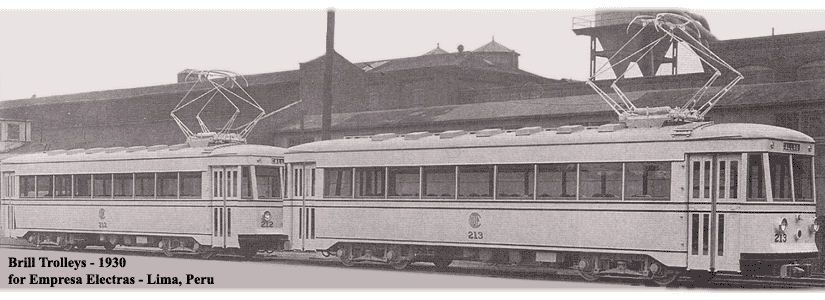
In 1953, more locomotives and rail cars were produced in Pennsylvania than anywhere else on earth. In the 1950s, iron and steel were the biggest industries in the state, followed by industrial and electrical machinery (think of Westinghouse making all those electrical transformers used worldwide). Also mentioned were shipbuilding, hatmaking, textiles and the brewing of beer.
Today, Pennsylvania's largest employer is Wal-Mart, followed by the U.S. Postal Service, the City of Philadelphia and the School District of Philadelphia. This is shocking and is a snapshot of what is happening in states, large and small, across the U.S.
In 1969 over one-quarter of our nation's workforce were employed in factories. By 2009, the figure had declined to 9%. Faced with ever increasing labor regulation, upwardly spiraling health care costs and the like, many companies are reducing their workforce by subcontracting - often overseas. Goodbye to high-paying, union jobs. And lower paying furniture-making jobs. Financial analyst Malcolm Berko wrote, "It wasn't long ago that big employers such as Maytag, Goodyear and General Motors paid Americans the equivalent of $40 to $60 an hour. Today many of America's largest employers - e.g., Wal-Mart and McDonald's - pay workers $8 to $12 an hour."
Sadly, the American public would rather buy on price - purchasing cheap footwear made in some Third World country from a discounter like Wal-Mart and, when a hole appears in the bottom, toss the shoes in the trash. This explains why there are almost no U.S. shoemaking plants anymore and why the number of independent footwear retailers and shoe repair shops is declining.
Reading between the lines, this book does much to explain the recent 'jobless recovery' - something which happens when you run your banking system like a dysfunctional three-card monte game, outsource all your subassemblies to Asia, close plants in Indiana and Michigan and move production to Mexico, close the tech support center in California and open one in Bangladore ... and vote for politicians who enact policies which make the aforementioned business actions the sensible thing to do.
Founded in 1902, the Bassett Furniture Company grew to become the world's biggest wood furniture manufacturer. Run by the same family for generations, it was the lifeblood of company town Bassett, Virginia. When Asian competition hit in the 1980s, Bassett responded by moving work overseas, reducing its workforce and closing plants.
In 1983, John Bassett III, a clever, driven third-generation furniture maker, broke away from the family business and went his own way. He is now chairman of Vaughan-Bassett Furniture Co., which employs more than 700 Virginians and has sales of more than $90 million. Author Beth Macy relates life Bassett's deeply personal furniture and family story, showing how he used legal maneuvers, factory efficiencies and sheer gumption to save hundreds of jobs.
You've heard tales about the abhorrent working conditions in China. This book offers several stories, including this shocker: As a Bassett Furniture vice-president, Rob Spilman visited China and toured furniture manufacturer Lacquer Craft. Rob was appalled by the "lack of safety measures in the finishing rooms - no fans, no masks, nothing. Rob actually had a fondness for the smell of finishing material, but these fumes were so strong he had trouble catching his breath. "How do they stand it," he had asked the plant manager, choking as he spoke. "Spray two years and die,' the manager replied."
Without burying the reader in numbers and charts, the author offers some startling statistics: "Between 2001 and 2012, 63,300 American factories closed their doors and five million American factory jobs went away. During the same time, China's manufacturing base ballooned to the tune of 14.1 million new jobs." The number of people receiving food stamps "tripled between 2000 and 2012, easily topping the number of newly-created jobs."
Interestingly, one of those 63,300 companies was my former company, Discovery Plastics, which perished in 2003 after its parent company was forced into a Chapter 7 liquidation bankruptcy. Interestingly, the tipping point for the parent company was the loss of J.C. Penny's business; the very same tipping point for Bassett Furniture.
The Bassett Furniture story is allegorical for business in the New America, where creative destruction runs amok and what's 'best' for us - global free trade, according to economists like Tom Friedman - may not be so good for us at all, as it pumps Wall Street at the expense of so many Main Streets - and industrial parks - throughout the land.
Verdict: A great read for anyone with an interest in manufacturing, globalization and/or the American economy and its future. Highly recommended. (posted 11/5/14, permalink)
'Diary Of A Mad Diva' by Joan Rivers
I had just returned from the public library, picking up my reserved copy of this book, when I found out that Joan had died at 81. I don't care if Joan Rivers was profane, tasteless and vulgar; she made me laugh. She was one of a kind.
This book had its moments but it wasn't that funny. The book was in a daily diary format which made it boring at times. If you want a proper dose of Joan Rivers, I'd recommend her previous book, 'I Hate Everyone ... Starting With Me', which I reviewed here. (posted 10/30/14, permalink)
'One Nation: What We Can All Do to Save America's Future' by Ben Carson, MD
Dr. Carson is a highly-respected surgeon; he was Chief of Neurological Surgery at Johns Hopkins. I have seen him interviewed on television; he offers plain-spoken, logical solutions to problems. His concise 256 page book is written in that same common-sense style and offers a compelling, Reaganesque message: American can return to greatness.
At the 2013 National Prayer Breakfast, he said that "our nation's decline has continued. Today the danger is greater than ever before, and I have never shared a more urgent message than I do now. Our growing debt and deteriorating morals have driven us far from the founders' intent. We've made very little progress in basic education. Obamacare threatens our health, liberty, and financial future. Media elitism and political correctness are out of control.
Worst of all, we seem to have lost our ability to discuss important issues calmly and respectfully regardless of party affiliation or other differences." While Carson's message was well-received by the audience, his breakfast podium companion, the notoriously thin-skinned Barack Obama, was less than pleased with Carson's speech.
Dr. Carson was raised in poverty in Detroit. But his mother provided tough love and instilled life lessons that made Dr. Carson the man he is today - a renowned neurosurgeon and an advocate for education, who developed the Carson Scholars Fund to encourage impoverished students to improve their prospects through reading and education.
The book identifies America's key problems and offers realistic solutions to them. On page 141, Carson wrote, "As my wife and I traveled around the country over the last few months, we encountered large and enthusiastic crowds, many of whom feel that I should run for public office. I believe what they are really clamoring for is not me per se, but for the return of common sense and intelligible speech to solve our-ever-increasing problems."
Sum-up: Highly Recommended. It's obvious America put the wrong black man in the White House. "Ben Carson for President in 2016" (posted 10/22/14, permalink)
'Blood Feud: The Clintons Vs. The Obamas' by Edward Klein
I thoroughly enjoyed the author's 2012 book, 'The Amateur: Barack Obama in the White House', and have been looking forward to reading his latest.
I wasn't disappointed. In 'Blood Feud', the former New York Times Magazine editor-in-chief Edward Klein delves into the rocky and often hostile relationship between the Obamas and the Clintons. I enjoyed the machinations on both sides in attempts to win the approval of Oprah and the Kennedy clan.
In this entertaining, gossipy book, the personal animosity and jealousy between the two powerful families practically drips from each page. It is confirmation of the lack of integrity of these four thin-skinned egomaniacs and those who do their bidding.
The Clintons and the Obamas come off as shallow and power-mad in the high level stakes political game played at the expense of the American electorate they claim to represent. Their lust for political power is disgusting; I wonder how any of them sleep at night.
Verdict: Fast-paced and juicy. Recommended. (posted 10/16/14, permalink)
'How The Poor Can Save Capitalism: Rebuilding the Path to the Middle Class' by John Hope Bryant
This thin (176 page) book is not what it seems. It is not a how-to book. Ideas are presented to solve ghetto poverty: caring bank branches which teach customers about finance (I'm not sure how that can be done, given that banks today don't want to interact with customers - they want you to stand outside in the rain and use an ATM card rather than getting their lobby carpet dirty and 'bothering' the tellers.), resurrection of home economics (or as Chuck Berry called it, Practical Math), teaching minorities how to improve personal credit scores, instructing students how to be entrepreneurs, etc. But, sadly, specifics are lacking.
The idea of prospective shop owners writing a business plan is mentioned but the how-to-do-it is nowhere to be found. And there is no 'Sources of More Information' listed at the end of the book to tell readers the best resources for things like writing a business plan. Or the key things you must do to be successful in starting a business. The overall tone of the book frequently crosses the line from optimistic to Panglossian, which - in my view - lessens its credibility.
John Hope Bryant is a successful self-made businessman and founder of the nonprofit Operation HOPE. Despite those credentials, Bryant makes many references to government/private partnerships - a recipe for disaster if I ever read one. The government has fostered poverty/dependency for the last 50 years. Two examples: 1) The Great Society, which institutionalized and celebrated the Welfare State, and 2) The government-run, moribund educational system. Republican black conservative Allen West noted, "For the left, "spending on education" generally means job protection and preserving benefits for teachers, rather than actually improving education for students in public schools, where black students can build a foundation for economic advancement."
It is interesting that, as I was reading this book, the riots in Ferguson, MO were front-page news. Looters destroyed many small business along the strip malls of this St. Louis suburb and probably bankrupted the owners, many of whom are minorities. Many of these business will never reopen, a pattern seen before in riot-torn cities across the U.S. over the last 50 years. The sad lesson: never be an entrepreneur in a black neighborhood. It's too risky.
In 1964, there were race riots in North Philadelphia. Hundreds were injured or arrested and more than 200 stores in North Philly were damaged or destroyed in three days of rioting. Many never reopened. No black entrepreneurs or coalitions stepped forward to fix these neighborhoods and/or create black-owned local businesses. White flight accelerated in the next decade. By 2011, Philly had the highest per-capita murder rate in the U.S. and much of North Philly is still boarded up.
Solving poverty starts with solving the culture of poverty. It begins with family, teaching values to children and leading by example. It continues with communities banding together, not to march and loot but to demand good education, including Practical Math.
This is a book of platitudes and generalities. Don't waste your time on it. (posted 10/8/14, permalink)
'Never Trust A Liberal Over Three - Especially a Republican' by Ann Coulter
This book contains little original material; it is mostly a collection of her past columns, some dating back over ten years. The material is not timeless but rather ordinary, time-sensitive, now-outdated columns. It came off to me as a lazy, cut-n-paste job.
If you want to read books by Ms. Coulter, better choices would be 'Demonic: How the Liberal Mob Is Endangering America' or 'Mugged: Racial Demagoguery from the Seventies to Obama'.
Verdict: Nothing new to see here; move along. (posted 10/2/14, permalink)
'Here Comes The Night: The Dark Soul of Bert Berns and the Dirty Business of Rhythm and Blues' by Joel Selvin
Pay no attention to the title of this book. It's less a story about Bert Berns but rather a tale of the evolution of R&B and pop music from the early postwar era through the late 1960s. It covers early rock & roll, girl groups, the British invasion and the beginnings of the psychedelic era. Profiles and interactions of many of the song writers, artists and publishing companies are interwoven with the dubious tactics of record companies, especially Atlantic Records.
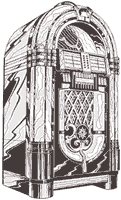 One memorable story in the book was about Dick Rowe, A&R man for the British arm of Decca records, who refused to sign the Beatles after being unimpressed with their audition at Decca studios. Rowe "traveled to Liverpool to catch the band's show at The Cavern but turned back after encountering a mob in the pouring rain outside the club blocking his entrance. It didn't occur to him until months later that the crowd was waiting to see the Beatles." Rowe told Brian Epstein, the Beatle's manager, that "guitar groups are on their way out." One memorable story in the book was about Dick Rowe, A&R man for the British arm of Decca records, who refused to sign the Beatles after being unimpressed with their audition at Decca studios. Rowe "traveled to Liverpool to catch the band's show at The Cavern but turned back after encountering a mob in the pouring rain outside the club blocking his entrance. It didn't occur to him until months later that the crowd was waiting to see the Beatles." Rowe told Brian Epstein, the Beatle's manager, that "guitar groups are on their way out."
The author seemed to focus on the negative parts of the music industry - the mob involvement, Dick Clark's underhanded tactics, the financial difficulties of songwriting legends Leiber and Stoller, payoffs, scams, cheating of artists and songwriters, etc. Many of these stories are at such variance with information I've found in other books, that I'm not sure what to believe.
The book was full of insignificant artists and songs I've never heard of, both of which made it less interesting. There are so many musicians, bit players, hangers-on, songs, sessions and promoters mentioned that the reader becomes distracted to the point where the story gets lost due to so many detours.
Berns, a music producer and songwriter, died of a heart attack at age 38 in 1967. He is best known for his compositions 'Twist and Shout' and 'Hang On Sloopy' but was not nearly as prolific a writer of hits as Neil Sedaka, Carole King, Mike Leiber and JerryStoller, Doc Pomus and others. I couldn't help but wonder why this relatively obscure guy deserved a book and a Broadway musical.
Better reading choices would include 'You Only Rock Once' by Jerry Blavat, 'How The Beatles Destroyed Rock 'n' Roll' by Elijah Wald, 'Hound Dog: The Leiber & Stoller Autobiography' by Jerry Leiber & Mike Stoller, 'Lonely Avenue: The Unlikely Life and Times of Doc Pomus' by Alex Halberstadt and 'Always Magic in the Air: The Bomp and Brilliance of the Brill Building Era' by Ken Emerson. (posted 9/24/14, permalink)
'Mad As Hell: The Making of 'Network' and the Fateful Vision of the Angriest Man in Movies' by Dave Itzkoff
'Network' was and is a great movie; it has held up well even though it was released in 1976. Itzkoff's book tells the behind-the-scenes story of this dark comedy, which transformed the way we thought about television. "I'm mad as hell, and I'm not going to take this anymore!" was the war cry of Howard Beale (played by Peter Finch). It has jumped by being a movie line to part of our pop culture lexicon - a cry by a crazed, delusional Thumper in a herd of clueless Bambis.
Angry, unhinged Beale was not nearly as angry as Paddy Chayefsky, 'Network's' driven, controlling, Oscar-winning screenwriter. But somehow, this odd film attracted a superb cast - Faye Dunaway, William Holden, Peter Finch, Beatrice Straight, Ned Beatty and Robert Duvall. Directed by Sidney Lumet, 'Network' managed to win four Academy Awards.
Since I loved 'Network', I was expecting the book to deliver more backstage gossip, swashbuckling and intense arguments from participants. Instead, I often found dulled angst. That made the book and uneven read with chapters that required slogging through with clenched teeth.
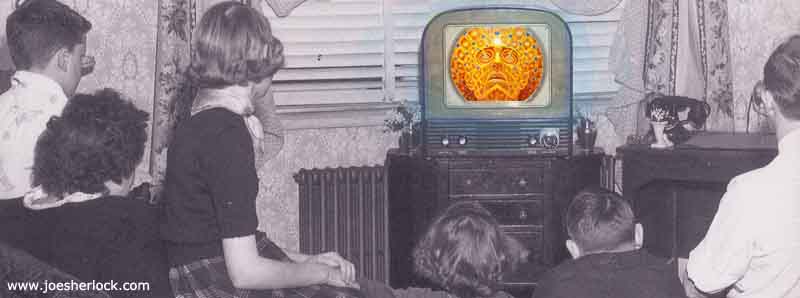
In putting together his book, Itzkoff contacted today's leading broadcasters and filmmakers in an attempt to assess 'Network's' lasting impact on television and popular culture. Answers varied but most admitted that corporate control of the networks has forced news divisions to become profit-centers. General Electric - a media company wannabe - bought NBC and jettisoned its Lexan plastic division, selling it to the Saudis. Now GE has sold its century-old household appliance business to Electrolux. Meanwhile, Disney now owns ABC and makes sure that The Mouse is never tarnished by bad news emanating from the Magic Kingdom. Or elsewhere.
As to the author interviewing current stars, I'm not interested about what Ben Affleck thinks about 'Network' - the guy was four years-old when the flick hit theaters, for Pete's sake. Let Affleck put on his new Batman costume and pontificate quietly in a corner to himself.
The proliferation of cable channels and their need to fill screen time 24/7 has traded news reading for sensationalism and has fragmented the target audiences. There are now enough channels out there to appeal just to you - whether you're a cross-dressing leather liberal with a whip and ball-gag or a conservative who wears neatly-ironed flannel shirts and wants to see the farm reports. Or, if you're a low-information voter who just wants to know about celebrities to fill your vacuous life, there's always the E! Network. Or TMZ.
Then there's the internet which delivers news and political opinion in a completely different and unfiltered way. We don't know what Chayefsky might have thought about that since he died in 1981.
'Network' offered a prophetic look at mega-corporations whose attention span was strictly limited to quarterly profits. But the mega-corporations also took over most of America's once-benevolent corporations and pulled the same kind of antics as the movie conglomerates.
Bill Holden's character truly represented everyman - the older, savvy executive who Gets Things Done but drinks a bit much and is fighting to save his job. He is harvested like bad wheat and tossed in the gutter by bosses who have the intelligence and emotional range of Formica. That's exactly what Corporate America became in the 1990s - a rerun of a 1976 award-winning movie. Who knew?
Verdict: Worth a read, especially if you fast-forward through the dull parts. (posted 9/18/14, permalink)
'James Madison: A Life Reconsidered' by Lynne Cheney
James Madison was the longest-surviving of the Founding Fathers. Lynne Cheney has written a well-researched, very detailed new biography of Madison. Her book contrasts Madison's viewpoints with those of his contemporaries Thomas Jefferson, Alexander Hamilton and Supreme Court Chief Justice John Marshall.
Ms. Cheney details the consequences of Madison's epilepsy which he had from his student days at Princeton to the end of his life. Considering the lack of treatment (and understanding) of the condition, it is remarkable that he accomplished so much. As president, James Madison led the country in its first war under the Constitution, the War of 1812. It was sad to read that Jefferson, Madison and his wife Dolley were paupers by the end of their lives.
This is a thick book, so detailed that it was hard to read at times, but finishing the book was certainly worthwhile. I learned much history from it. Definitely recommended.
A good companion book is 'Declaration: The Nine Tumultuous Weeks When America Became Independent, May 1-July 4, 1776' by William Hogeland. (posted 9/10/14, permalink)
'Capital in the Twenty-First Century' by Thomas Piketty
After some 235 pages (of its almost 700 pages), I gave up. I found this book to be denser than a black hole and as boring as an evening with Al Gore. I learned nothing from this obtuse tome. You know what else bothered me about it? Paul Krugman praised it. As did some other prominent left-wingers. This is the equivalent of Billy Joel endorsing a driving school.
It seems to be a rant against rich capitalists with a lot of graphs, many of which are incomprehensible. Piketty argues that saving and capital accumulation by wealthy capitalists serves to reduce wages; in other words, the rich get richer and the worker gets screwed. This flies in the face of real-world facts. Most entrepreneurs build wealth by their creativity and wits, creating jobs, many of which pay quite well. These folks are not trust fund babies; the founders of Apple, Microsoft, FedEx, Facebook and other recently established mega-enterprises were mostly middle-class people with street smarts and an great idea.
In my own business, I created new jobs every year. And as my business prospered, my workers made more money. That business was begun with personal savings and grew because profits were reinvested each year.
|
|
| On a cold, foggy late-Fall Oregon morning in 1978, my business partner and I watched as our first plastic vacuum-forming machine was delivered. It had traveled cross-country from the manufacturer in North Carolina and was our first major equipment investment, purchased with our own funds. Within a month, it was generating cash, producing electronics cases.
One of our earliest customers was a start-up firm, Flir Systems. This manufacturer of infrared devices is now a publicly traded S&P 500 company with annual sales exceeding $1 billion.
|
Incidentally, the Financial Times and other noted publications and individual experts have accused Piketty of fudging his data to fit his neo-Marxian theories. Here's one more voice slamming Picketty's theories.
Verdict: Waste-O-Time. (posted 9/4/14, permalink)
'Not Cool: The Hipster Elite and Their War on You' by Greg Gutfeld
Greg Gutfeld is a brilliantly funny social commentator. His middle-of-the-night cult show, 'Red Eye', is fast-paced and interesting. Greg is also a regular on 'The Five', another Fox News show.
In this book, Gutfeld posits that what we wear, eat, smoke, drink and who we vote for is carefully crafted and manipulated by progressive, self-styled 'cool' people. In his latest book, the author outlines a plan for reclaiming the real American ideal of cool: building businesses, protecting freedom and taking responsibility for one's actions.
Gutfeld's style is snarky, comic and sarcastic, but he uses these attributes to reinforce his arguments. Unfortunately, there's a lot of repetition in this book. I found that annoying even though I agree with his premise that self-important, self-appointed doofus hipster elites have too much influence on our culture and our politics.
He wrote, "Pick a political, cultural, or moral universe, and in each one it's the cool who seek to punish, mock, or thwart the uncool. They do this freely and without much resistance, for exacting cool revenge is so common that the uncool let it happen without a fight - a sort of cultural Stockholm syndrome. Even as the cool put out ads condemning bullying, they spend the rest of their time turning persecution into an art form. The cool are just bullies with stylists and publicists."
And: "… in any place where something isn't cool, you will see these three words strung together: 'old white men'. Whether it's a clunky news editorial on gun control or a withering analysis of a Republican debate, the media will dismiss it with that handy cliche - they're just “old white men." And furthermore, "The definition of cool: popularity without achievement. It's how President Obama got the youth vote."
While this book has its moments, it is not as good as his earlier works, 'The Joy of Hate: How to Triumph over Whiners in the Age of Phony Outrage' and 'The Bible Of Unspeakable Truths'.
Verdict: This book is OK but if you want Gutfeld at his best, read his earlier works. (posted 8/27/14, permalink)
'The Arsenal Of Democracy: FDR, Detroit, and an Epic Quest to Arm an America at War' by A.J. Baime
World War II history is a big pie and A.J. Baime's book represents a very small, if well-written slice. This book is a very incomplete look at the unprecedented industrial mobilization of America for the war effort. It focuses mostly on Ford Motor Company's internal struggles as it ramped up to produce B-24 Liberator bombers at the rate of one per hour at its huge, newly-constructed Willow Run plant. After the war, the plant was used by General Motors to produce Chevrolet Corvairs and Novas.
Much is written in the book about the complex and sad relationship between Henry Ford and his son Edsel as well as the managerial chaos within Ford caused by the increasingly senile Henry and his chief thug, Harry Bennett. The book is as much a story for the fight for the soul of Ford as it is to story of making war planes. Most of the war focus is on the European Theater rather than the Pacific Theater.
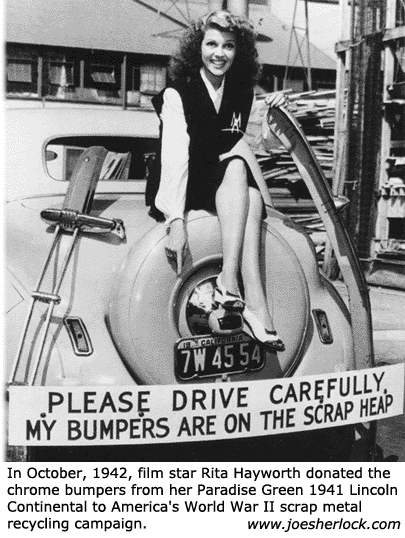
While this book is an enjoyable read, for a more comprehensive look at America's industrial mobilization during the war, I would recommend 'Freedom's Forge: How American Business Produced Victory in World War II' by Arthur Herman. (posted 8/21/14, permalink)
'Fizz: How Soda Shook Up the World' by Tristan Donovan
This is a breezy and interesting book about carbonated drinks. It opens with the Coke/Pepsi space war of the 1980s when the big soda makers competed to get their branded cola on the U.S. Space Shuttle. Then it flashes back to 216 B.C., when the legendary Carthaginian general, Hannibal crossed the Pyrenees on his way to fight Italy, he reportedly paused his 46,000 troops and 37 war elephants at the waters of Les Bouillens in France before marching on to victory against the Romans. Today, that same spring water provides the world with Perrier. Who knew?
Here are some things I learned from this book:
• In 1767, Richard Bewley of England began producing fizzy water which he named Mr. Bewley's Mephitic Julep.
• In 1858, Erasmus Bond, owner of a London soft-drink company, developed the first carbonated tonic water. To help prevent malaria in primitive countries, he added lots of quinine, rendering the drink extremely bitter. Brits in India and Africa added gin to make the drink more palatable. And thus was invented the gin and tonic.
• Dr. Benjamin Rush was a Philadelphia physician and signer of the Declaration of Independence. He was also enthusiastic about the health benefits of natural sparkling water. Rush recommended the water from a 26-foot deep well in Philadelphia (near 6th and Chestnut Sts.) to his patients as a treatment for such conditions as hysteria, worms, kidney disease and ulcers. Philadelphians flocked to the foul-smelling well and "held their noses while they drank for their health." Then the well ran dry. Attempts to reconnect the well "ended when it was discovered that the unpleasant smell ... was caused by a leak in a nearby privy." Oops.

Our first apartment was in Rushwood, once part of the estate of Benjamin Rush in Northeast Philadelphia. My new bride and I were the first tenants, occupying it in June 1966. Rent for a one-bedroom with garage was then $92.50 per month. Rent now starts at $1,100 per month.
• Problems plagued the bottling of soda until William Painter invented the Crown Cork bottle cap in 1892. He soon founded Crown Cork & Seal in Baltimore, a firm still in business today and known as Crown Holdings, Inc. During his time with the Pennsylvania Railroad, my dad made a lot of deliveries to Crown Cork's Bridesburg Plant in Philadelphia.
• Hires Root Beer was originally known as Hires Herbal Tea.
• Much has been made of the cocaine content of Coca-Cola's original formula but cocaine-laced drinks were popular in the late 19th Century. Vin Mariani, a cocaine-laced wine, was quite popular in Europe and America. Pope Leo XIII carried it around in a hip flask. Thomas Edison said the drink "helped keep him awake."
• Dr. Harvey Wiley, chief chemist at the Department of Agriculture was a staunch prohibitionist and was anti-soda as well. "His parents raised him on a diet of bread made from unbolted cornmeal and a brand of fundamentalist Christianity that regarded whistling and fishing on Sunday as terrible sins."
• During Prohibition, Jake, made from fermented Jamaican ginger, "left an estimated 15,000 to 100,000 people impotent or partially paralyzed for life. The hobbling walk of those crippled by the drink became known as 'Jake leg'."
• Ginger ale was developed in Belfast, Ireland in the early 19th Century. Vernor's ginger ale, the 1866 creation of Detroit pharmacist James Vernor, is still sold today and is America's oldest surviving soda brand. I've tried it and it's quite tasty.
• During Prohibition, 75% of ginger ale sold was used as a mixer to cut the harsh taste of bathtub booze. Not one to miss an opportunity, gangster Al Capone set up ginger ale and club soda bottling plants so he could monopolize the Chicago market. His older brother, Ralph 'Bottles' Capone, ran the soda operation for Big Al.
• New England's homegrown soda, Moxie, was Coke's big challenger until the 1930s, thanks to wild promotional devices:
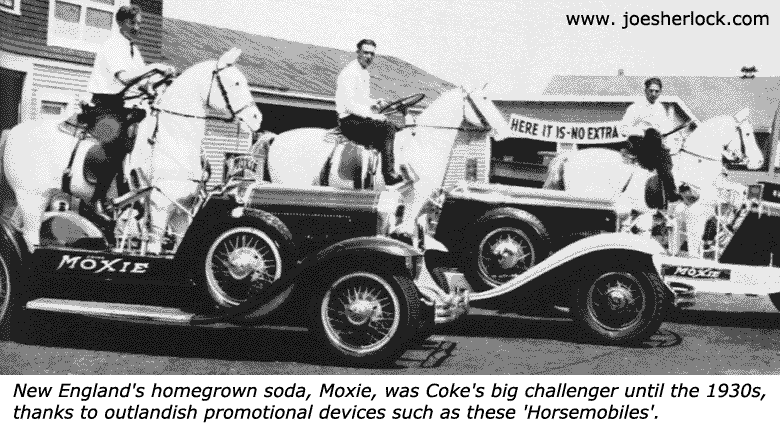
• Richard Nixon had a long relationship with Pepsi-Cola and was disliked by the president of Coca-Cola, who turned him down for a job after Nixon lost the 1962 California gubernatorial election. When Nixon became president, he ordered all Coke vending machines out of the White House and had them replaced with ones dispensing Pepsi.
• Scots love Glasgow-based Irn-Bru soda. It's name was changed during the 1950s "to comply with U.K. food-labeling laws that made it illegal for the drink to be called Iron Brew because it didn't contain any iron and wasn't brewed."
You won't find every brand of soda pop discussed - you'd need an encyclopedia for that. So don't be disappointed if your favorite regional brand, such as Philadelphia's Frank's Black Cherry Wishniak isn't mentioned, although the Midwest favorite, Green River is.
This is a wonderful, easy-to-read book. Highly recommended. (posted 8/13/14, permalink)
'Ava Gardner: The Secret Conversations' by Peter Evans and Ava Gardner
Ava Gardner was once a Hollywood movie star in the 1940s and '50s but, after a life of drinking, smoking sixty cigarettes a day and suffering two strokes, she's broke and worn out. She needs money and hopes to get it from a book deal. The author interviews her several times but Ava abruptly backs out of the deal.
Gardner was half-drunk for most of the interviews .. so who knows what to believe. The author waited until Ava - and her former husband Frank Sinatra - died before writing the book. In the midst of it, he died, so an 'ending' is constructed by a third party.
This is an boring, vacuous book about an empty woman with an unfulfilling life. Verdict: Don't bother. (posted 8/7/14, permalink)
'Busted: A Tale of Corruption and Betrayal in the City of Brotherly Love' by Wendy Ruderman and Barbara Laker
Allow me to begin by confessing that I finished this book in a single day. It was that engaging and interesting. 'Busted' is a true story of two Daily News reporters in Philadelphia uncovering and writing about police corruption in its elite narcotics unit. Cops on the take in Philadelphia is nothing new; my grandfather was shaken down by the Philly police back in the 1920s. And I was in the early '60s. This time, in addition to fabricating drug busts, the narcotics squad systematically looted independent mom-and-pop stores and bodegas, terrorizing hardworking immigrant owners. One cop also sexually assaulted large-breasted women during raids.
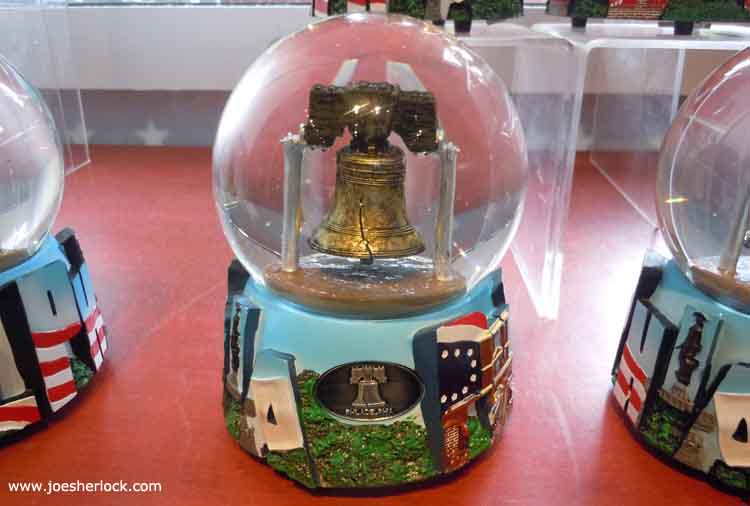
The authors offer a fascinating and detailed look about street level, belly-to-belly investigative reporting. Their published stories exposed the rotten underbelly of a corrupt, collapsing American city and earned them a Pulitzer Prize.
The last chapter of this saga is still to be written; the bad cops still have their badges and continue to receive full pay, while the victims yet to see justice served. Unfortunately, justice in Philadelphia often never prevails, unless you have connections or juice.
There is a second story meandering through the book - during the investigation, the parent company of the Inquirer and Daily News newspapers was hemorrhaging money. At one point, one potential new investor was "David Haas, an heir to the Rohm and Haas chemical company fortune." Unfortunately, the new investors were outbid and the future of the two newspapers remains tenuous.
Highly recommended. (posted 7/31/14, permalink)
'One Summer: America 1927' by Bill Bryson
Here's a book about one amazing time in America - 1927, when Lindbergh crossed the Atlantic, Babe Ruth hit 60 home runs, legendary fighter Jack Dempsey lost to Gene Tunney, Calvin Coolidge announced he wouldn't run for another term, work started on Mount Rushmore, Sacco and Vanzetti were executed, Henry Ford stopped making Model Ts and talkies came to the movies. And more.
Bryson is the author of many books, including the enjoyable 'At Home', which I reviewed here.
I learned several interesting things from his latest book:
• During World War I: "By the spring of 1917, the life expectancy of a British pilot was put at eight days."
• There was a great deal of coverage of the murder trial of Ruth Snyder, who murdered her husband by bashing in his skull with a sash weight. "Outside the courthouse, lunch wagons set up along the curb and souvenir sellers sold stickpins in the shape of sash weights for ten cents each."
• In 1927, "42% of all that was produced in the world was produced in the United States. America made 80% of the world's movies. Kansas alone had more cars than France."
• "In Oshkosh, Wisconsin, a local law made it an offense for dancing partners to gaze into each other's eyes. In Utah, the state legislature considered sending women to prison if their skirts showed more than three inches of leg above the ankle."
• The Holland Tunnel connecting New York City and New Jersey presented such formidable design and construction challenges "that the tunnel's chief engineer, Clifford M. Holland, dropped dead from the stress before it was finished. He was only 41, but at least he had the honor of having the tunnel named for him. His successor, Milton H. Freeman, keeled over just four months into the job himself, dead of a heart attack of his own, but received no commemoration." Nor did the thirteen other workers who died in the course of the tunnel's construction.
• During World War I, there was much anti-German sentiment in the U.S. Sauerkraut famously became Liberty Cabbage. Iowa "outlawed conversations in any language other than English in schools, at church or even over the telephone. When people protested that they would have to give up church services in their own languages (Catholic Masses were done almost entirely in Latin in those days), Governor William L. Harding responded, 'There is no use in anyone praying in languages other than English. God is listening only to the English tongue.'"
• In the '20s, grander movie theaters were constructed in order to attract customers. "Theaters were built on a scale that was truly epic, with auditoriums that could seat two thousand or more patrons in an atmosphere of opulence greater than they had experienced anywhere before. People, it was said, went to Lowe's theaters just to enjoy the restrooms .... At the Tivoli in Chicago, the marbled lobby was said to be an almost exact copy of the king's chapel at Versailles, except presumably for the smell of popcorn."
• Babe Ruth resided at the Ansonia Hotel, an palatial apartment hotel in New York. The Ansonia "featured a lobby fountain with a live seal and a "roof farm" where the management kept cows and chickens to provide milk and eggs for favored residents." The basement contained the world's largest swimming pool.
• Robert Rutherford McCormick owed the Chicago Tribune newspaper as well as many other enterprises including paper mills, ships and banks. "As the years passed, McCormick became increasingly eccentric. When the president of the Lake Shore Bank ... displeased him, McCormick demoted him to running a vegetable stand outside his estate."
Bryson has penned another delightful and interesting book. Highly recommended. (posted 7/24/14, permalink)
'The Life of the Automobile: The Complete History of the Motor Car' by Steven Parissien
I had high hopes for this book. The author is British and, in general, the Brits are very good at drilling down for accurate, detailed information, especially about machine-age subjects such as planes, trains, automobiles and the car industry.
|
|
|
This is what a wide whitewall should look like.
|
I should have been tipped off by the cover photo, a stock Getty image of a 1938 Buick front side. The color photo was given a green tint which gave the discolored whitewall tire an eerie yellow-green color. How difficult would it have been to clean up the whitewall and make it white again? About two minutes in Photoshop, I'd reckon.
Sadly, the book told many interesting stories but was so riddled with errors that I didn't know what to believe, especially Parissien's tales about the European auto industry, about which I have little expertise. So, I don't know if the British Citroën factory was really used to make Milky Way and Twix candy bars after Citroën closed it. But I found a plethora of errors and misinformation about subjects I know. Here's a sampling:
• The infamous fatal accident of 1950s movie legend James Dean was incorrectly described and the vehicle which hit Dean's Porsche 550 Spyder was not a pick-up truck, it was a 1950 Ford Tudor.
• Ray Kroc did not force the McDonald brothers out of business; he bought out the fast food pioneers.
• The author's tale of the ill-fated Edsel and who was to "blame" is flat out wrong.
• Parissien states that the 1947 Studebaker "received the backhanded compliment of having its lines plagiarized by in 1952 Ford for their Crestline and smaller Lincolns." Huh? By the way, in the 1952 model year, all Lincolns were one size - there was no Mercury-based "junior" Lincoln after 1951. He also writes that the 1957 Buick Roadmaster coupe "looked just like the (1947 Studebaker) Starlight's stablemate." What?!
• The statement that Lincolns and Cadillacs of the 1950s routinely achieved 20 miles per gallon is untrue. In the Mobilgas Economy Run of 1956, big car award winners Buick and Packard only got 17-18 mpg, using every trick in the book in a contest which used an average speed of 40 mph. The stripped-down Studebaker Champion six only got 20 mpg in the same Mobilgas contest. Based on my experiences and observations, big luxobarges of the 1950s got 10-15 mpg, depending on conditions in everyday use.
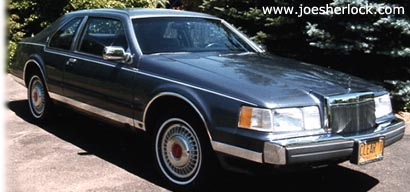 • Parissien writes that the 1986 Ford Taurus "introduced flush front headlights" to the U.S. Actually, flush aero headlights first appeared on the 1984 Lincoln Continental Mark VII. • Parissien writes that the 1986 Ford Taurus "introduced flush front headlights" to the U.S. Actually, flush aero headlights first appeared on the 1984 Lincoln Continental Mark VII.
• The author claims that the 1967 Chevrolet "Camaro was in essence a remodeled Chevette." The Camaro was based on the compact Chevrolet Nova platform. The hideous little subcompact 4-cylinder Chevette didn't appear in the U.S. until the 1976 model year. Parissien should know better because there was a Vauxhall version of the Chevette introduced in his home country in May 1975.
• Elvis' first Cadillac was not a '55 model; it was a 1954 Fleetwood 60 sedan which caught fire while traveling to a gig. And despite the author's remarks that "Elvis' Cadillacs were almost as famous as the star himself," Elvis was not a Cadillac man.
• The author has a lot of trouble with Lincoln nomenclature, mixing up the iconic '56-57 Continental Mark II with the 1960 Lincoln Continental Mark V and often refers to the iconic slabside Lincolns of '61-'65 as "Continental IIIs."
 • Parissien claims that Chevrolet was the top-selling American car in 1959. Actually, Ford took top honors that year. • Parissien claims that Chevrolet was the top-selling American car in 1959. Actually, Ford took top honors that year.
• The author mistakenly states more than once that General Motors' Styling VP Harley Earl was associated with designing Ford's Mustang and Thunderbird models. Preposterous.
• The book claims that in "1968, the Toyota Corolla became the first Japanese car to be manufactured in the U.S." The first Japanese car to be made in America was a Honda, made in Ohio beginning in 1979. Toyota did not begin U.S. assembly until 1984.
• The claim is made that "federal authorities ... forced GM to disgorge many of the marques that made it famous, including Pontiac and Dodge." Dodge has been around for 100 years and is still made by Chrysler, not GM.
Was there no fact-checking done by the publisher? (I couldn't believe all the rigorous fact-checking I was required to do by the editors of my books. They made me provide documentation, too.) Parissien's book is a junkyard of wrecked and twisted facts and I cannot in good conscience recommend it.
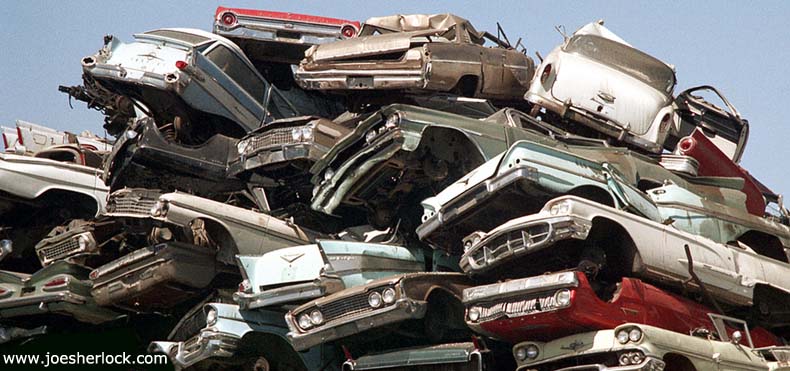
Verdict: Avoid at all costs. (posted 7/16/14, permalink)
'President Me: The America That's In My Head' by Adam Carolla
I've read all three of Carolla's books and this one is much better than 'Not Taco Bell Material' and almost as good as 'In Fifty Years, We'll All Be Chicks'.
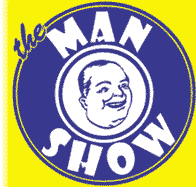 In this tome, Carolla - once the host of the politically-incorrect 'The Man Show' - outlines the changes he will make were We the People elect him as U.S. President. He tackles problems great and small, from the bloated and misguided Department of Transportation to the placement of alarm clocks in hotel rooms. In this tome, Carolla - once the host of the politically-incorrect 'The Man Show' - outlines the changes he will make were We the People elect him as U.S. President. He tackles problems great and small, from the bloated and misguided Department of Transportation to the placement of alarm clocks in hotel rooms.
On education: "Until you get the family unit back together, we have no hope and we'll never dig ourselves out of this hole. No matter how great the school is, how excellent the teachers are, how many computers, field trips, or other window dressing there is, until you have intact families that give a s***, we're doomed. If you have chalk, pencils, and a roof that doesn't leak, you've got a school. Back in the day people would do stuff by candlelight on the prairie and are a f***load smarter than kids now despite all the iPads and online homework. Why? Because if they didn't read their assignment, their parents would take the ruler they were supposed to be using for that assignment and smack them with it. We don't need to keep throwing money at the problem, we need to throw parents at the problem."
He is a fan of limited government: "Fixing your f**ked-up life is not government's job." And: "I don't know why I seem to be the only one who understands that when the government provides something for free - whether it's food, housing, or health care - there is a human cost. The government may be handing you a free block of cheese but they are taking away your motivation to get a job and buy your own f***ing cheese. And what more powerful motivator is there to get up, get work, and get insurance than the fact that not having it could literally kill you?"
In this very funny, somewhat profane book, Adam speaks honestly, "I'm not doing this for me. I'm doing it for you, love of country and my plan to order the surgeon general and NASA reanimate the corpse of Marilyn Monroe."
Highly recommended. He's got my vote. (posted 7/10/14, permalink)
'Flash Boys: A Wall Street Revolt' by Michael Lewis
A small group of Wall Streeters discovered that the U.S. stock market has been rigged for the benefit of insiders. Working at different firms, they came together to derail the unscrupulous tactics used by high-frequency traders.
I was inspired to read this by a piece aired on '60 Minutes'. The book didn't disappoint. It is a well-crafted true story and the author keeps things interesting, even for the lay person.
Recommended. (posted 6/30/14, permalink)
'The Monuments Men: Allied Heroes, Nazi Thieves and the Greatest Treasure Hunt in History' by Robert M. Edsel
As Hitler expanded his conquests, he ordered his armies to seek and capture the finest art treasures in Europe. Tons of rare and precious paintings, statues and the like were stolen by Nazis - from countries, museums and individuals. A special group of American and British museum curators, art historians and others - The Monuments Men - risked their lives scouring Europe in the midst of battle after battle to prevent the destruction of thousands of years of culture, contained in paintings, statuary, church art and historical relics.
This book provided a completely different view of World War II. This well-written work kept my interest from beginning to end. It spotlights a remarkably effective and selfless group of individuals driven by their love for art and its preservation.
Verdict: Highly recommended for anyone with even a passing interest in history and the arts. (posted 5/11/14, permalink)
'The Man Who Killed Kennedy: The Case Against LBJ' by Roger Stone
After watching author Stone speak on BookTV last month, I was impressed enough to order his book. It is a very interesting but flawed work. He claims that Lyndon Baines Johnson (with help from the CIA, J. Edgar Hoover and the Mafia) was the driving force behind a conspiracy to murder President John F. Kennedy on November 22, 1963. This makes for a good premise, since Lyndon Johnson was known to be an often-drunk, philandering schemer, characterized by at least one Secret Service agent as a truly "insane" individual.
Stone's evidence is somewhat compelling and often fascinating but, in the end, he leaves readers with only circumstantial evidence. Parts of the book are repetitive, the author rambles a lot and includes extraneous material such as his dislike of George H.W. Bush and his discussions about Richard M. Nixon, neither of whom had any involvement in JFK's assassination.
Verdict: Case not closed ... but the book does make you scratch your head and think. I wish it was better edited and more focused. (posted 5/9/14, permalink)
'His Ownself: A Semi-Memoir' by Dan Jenkins
Having read and enjoyed 'Semi-Tough' and 'Dead Solid Perfect', Jenkins earlier novels, I was looking forward to his memoir. It had its good points but sagged in spots. Sadly, there was page after page of name-dropping (famous people and places) and filler material - excerpts from other writers' and snippets his daughter's sports articles. These were distracting and the constant references to the many tony restaurants Jenkins patronized along with the celebrities he spotted at nearby tables made me wince more than once. I did enjoy his stories about golf legend Ben Hogan.
I never laughed out loud but I did smile a few times while reading this book.
Verdict: Semi-worthwhile. (posted 5/7/14, permalink)
'Life Inside The Bubble: Why a Top-Ranked Secret Service Agent Walked Away from It All' by Dan Bongino
This much-hyped book had so much potential but ultimately disappointed. There's nothing about what it was like serving the Clintons, Bushes and Obamas - no comparisons. This was more of a self-serving memoir and was whiny in spots. And boring.
The last chapters on Fast and Furious, Boston Marathon bombing and Benghazi offer few original insights - better analysis has been done by many other pundits.
Verdict: Don't bother. (posted 5/5/14, permalink)
'The Race Underground: Boston, New York, and the Incredible Rivalry That Built America's First Subway' by Doug Most
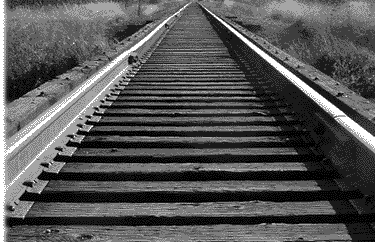 By the late 19th century, large cities had become more congested and streets were clogged with slow-moving horse drawn vehicles. In his book, 'The Good Old Days, They Were Terrible', Otto Bettmann wrote of "streets caked with animal waste", noting that there were over three million horses in American cities at the turn of the Century, each producing 20-25 pounds of manure per day. During dry spells, the pounding of hooves refined the manure to dust which blew "from the pavement as a sharp, piercing powder to cover our clothes, ruin our furniture and blow up our nostrils." By the late 19th century, large cities had become more congested and streets were clogged with slow-moving horse drawn vehicles. In his book, 'The Good Old Days, They Were Terrible', Otto Bettmann wrote of "streets caked with animal waste", noting that there were over three million horses in American cities at the turn of the Century, each producing 20-25 pounds of manure per day. During dry spells, the pounding of hooves refined the manure to dust which blew "from the pavement as a sharp, piercing powder to cover our clothes, ruin our furniture and blow up our nostrils."
Then there were the flies. Disease-carrying flies. And the smell. New York City of the period was described by a visitor as a "nasal disaster." Bettmann noted that the 15,000 horses of Rochester NY produced enough manure in 1900 to cover an acre of ground with a layer 175 feet high. This steadily increasing production caused more pessimistic observers of the period to predict that American cities would disappear like Pompeii - but not under ashes.
A solution was needed. Two brothers from one of the nation's great families - Henry Melville Whitney of Boston and William Collins Whitney of New York - pursued the dream of developing America's first subway with electric-driven fast railcars replacing horses.
Doug Most tells a good story, relating tales of technical problems, political roadblocks and electrical issues. The book is not perfect, the 'race' and rivalry between the two brothers is mostly contrived and the book jumps around a lot as it goes back and forth between Boston and New York, with occasional forays into Virginia, London, Berlin and Liverpool. But the 'The Race Underground' has enough people stories, colorful characters and interesting twists and turns that it makes for a very good read. Recommended. (posted 5/2/14, permalink)
'The Pope And Mussolini: The Secret History of Pius XI and the Rise of Fascism in Europe' by David I. Kertzer
For me, this was an eye-opener of a book. The author spent seven years of research in the Vatican and Fascist archives, including reports from Mussolini's spies inside the highest levels of the Church, to properly define of the Vatican's role in the rise of Fascism.
Pope Pius XI played a crucial role in keeping Mussolini in power - both men hated and feared communists. Il Duce reciprocated by restoring many of the privileges the Church had lost and gave in to the pope's demands that the police enforce Catholic morality and suppress Protestant proselytizing within Italy. Late in the pope's life, his faith in this treacherous bargain wavered as the Italian dictator grew ever closer to Adolf Hitler and the Nazis.
We learn of Cardinal Caccia Dominioni, a well-know pederast (illustrating that sex abuse by the clergy is not exactly a recent thing), who was Pius XI's Prefect of the Pontifical Household. And of Eugenio Pacelli, papal nuncio to Germany (1917–1929) and, later, Cardinal Secretary of State, in which capacity he worked to finalize treaties with Nazi Germany. Criticized for failing to act boldly to expose the Nazi abuses and genocide, Pacelli became Pope Pius XII in 1939. His actions during World War II would be subject for debate for decades to come. And are still debated.
I learned an exceptional amount about Pope Pius XI, Benito Mussolini, the rise of Fascism in Italy, the hierarchy of the Catholic Church and the selective outlook of the Vatican during the period. Recommended. (posted 4/30/14, permalink)
'The Undercover Economist Strikes Back: How to Run - or Ruin - an Economy' by Tim Harford
This book is a discussion - in layman's terms - about microeconomics. Harford uses a Q&A format with lots of anecdotes - many absurdly humorous - to make his points. He discusses recessions (including the D.C. Babysitting Recession of the 1970s), money (including the Yap Islands' heavy stone currency), inflation, stimulus, output gaps, unemployment, management, GDP, happiness and the limits of economic growth.
I found this book to be entertaining, readable, informative and fun. Highly recommended if you're interested in economics. (posted 4/28/14, permalink)
'The Up Side Of Down: Why Failing Well Is the Key to Success' by Megan McArdle
This book started out with great promise and actually has some good lessons to teach. Megan McArdle posits, in a thought-provoking way, that you have to learn how to harness the power of failure in order to succeed. Unfortunately, the book often heads off into the weeds with tales of finance guru Dave Ramsey, too many McArdle personal stories and the pros and cons of various government programs.
This book could have been far more condensed. In fact, some of the material seemed so familiar that it made me go back and reread a chapter from my first business book, published 17 years ago. That chapter, 'Keep Trying Until Something Works', is posted here. It covers much of what McArdle sought to convey.
McArdle's book is worthwhile but you may elect to skim the superfluous parts. (posted 4/17/14, permalink)
'Japan 1941: Countdown to Infamy' by Eri Hotta
This fascinating book considers the attack on Pearl Harbor - and the events leading up to it - from the Japanese perspective. Author Hotta reveals just how divided/conflicted Japan's leaders were, right up to their eleventh-hour decision to attack the U.S. They attacked despite the knowledge that they could not possible win a protracted war against the United States.
Hotta details the debates and internal warfare between the military and politicians and the hardships inflicted on the Japanese people by the rationing due to multiple wars with China and other Asian nations. The author weaves an engrossing tale about the human foibles in institutional decision making and the blustery pride that led to the deaths of millions.
An essential book for any student of the Second World War, it will shed a different light on the events leading up to the war's start. Recommended. (posted 4/9/14, permalink)
'Company Man: Thirty Years of Controversy and Crisis in the CIA' by John Rizzo
This memoir covers the author's 34 years with the Central Intelligence Agency. He served under eleven CIA directors and seven presidents and became a notorious public figure during the "enhanced interrogation techniques" controversy.
While it is interesting to read about the various events during Rizzo's tenure (Iran-Contra, 9-11 and terrorist interrogations) and the personalities he encountered along the way, the most important thing I got from reading the book was insight into the process of Congressional 'oversight' and how politicized and potentially ineffective it has become. Rizzo doesn't think much of several rude Senators, especially Senate Intelligence Committee Chairwoman Dianne Feinstein (D-Calif).
This is not an exciting book; it is methodical and sometimes a bit boring but it is nevertheless, worth a read. Recommended. (posted 4/2/14, permalink)
'The Baby Boom: How It Got That Way (And It Wasn't My Fault) (And I'll Never Do It Again)' by P.J. O'Rourke
Mr. O'Rourke is familiar to regular readers of The View Through The Windshield; he has been awarded the Quote of the Day on several occasions - an honor which confers more prestige than two free Big Mac Extra Value Meals or four Grammys.
Part memoir, part observational humor, this lighthearted book is at its best covering the author's pre-college years. At his best, P.J. O'Rourke is a thoughtful Hunter S. Thompson, with considerably lower systemic drug levels. His trademark rapier wit, often seen on various on-air gigs, appears throughout in the book. Here is a sampling:
• Regarding early television, O'Rourke mentions 'The Today Show' "with Dave Garroway, coanchored by a chimpanzee named J.Fred Muggs. (Not as attractive as Katie Couric but as incisive.)"
• Some cars of the era were strange, "like the 1960 Plymouth Valiant, which looks like its styling was done by four men who lacked a common language working together in a dark room."
• Some cars of the time are works of art, including "all Corvettes until 1973 when they start to get into trial-separation-and-combover-looking."
• He reminds us that in simpler times in the suburbs, "dead ends had not yet gained the cachet of cul-de-sacs."
• The era known as The Sixties, started in 1967 and "came to an abrupt halt in 1973 when conscription ended and herpes began." It is not to be confused with The Fifties, which began on October 14, 1947.

'The Baby Boom' suffers some decline in later chapters and became tedious - almost whiny - in spots. Perhaps just like some aging baby boomers themselves.
This book, while entertaining, was not as funny as O'Rourke's earlier work, 'Driving Like Crazy'. Nevertheless, I recommend it. It's an easy, fun read. (posted 3/27/14, permalink)
'Memoirs Of A Hack Mechanic' by Rob Siegel
The majority of visitors to this book review page come as a result of a link from my blog. Because the blog has an automotive theme, many of my blog readers are car guys. So, I'll begin this review with a simple message: If you're a car guy, you should buy Rob Siegel's book.
For many years, Siegel has written a column for the BMW Club magazine, 'Roundel'. The book reprints many of these columns along with new, updated and expanded material. Siegel loves old, decrepit BMWs and enjoys bringing them back to life and driving them. He has owned twenty-five 2002 models. But have no fear, you don't have to be a Bimmer fan to enjoy the book. I'm not a BMW enthusiast, although I still have a digital stopwatch which I got in 1988 from a BMW dealer as a premium for test driving a new 7-Series. I liked the stopwatch better than the car and used it when I road tested a Lincoln Mark VIII in 1995.

Siegel blends car stories, do-it-yourself how-to (and how-not-to) tips along with humorous tales of his automotive conquests and foibles. You'll enjoy his irreverent humor, his philosophical musings and his ability to link the deep interpersonal connections between cars, their owners, families and friends. As humans, we're linked by six degrees of tire camber, tie rods, crankshafts ... or something metaphysically similar.
This is one of the best auto memoirs I've come across. Each well-written chapter is full of wit, insight and knowledge. Highly recommended. (posted 3/21/14, permalink)
'George Washington's Secret Six: The Spy Ring That Saved the American Revolution' by Brian Kilmeade with Don Yaeger
You may know Brian Kilmeade from Fox News' morning show 'Fox & Friends' which he co-hosts. In this book, Kilmeade and co-author Don Yaeger relate the fascinating story of the Culper spy ring that operated in Long Island and New York during the War of Independence. This is a slightly-fictionalized (because of the paucity of factual details available), dramatized history rather than a scholarly work.
You'll find no footnotes here but the story is compelling. It is a dramatic account of account of a Revolutionary War aspect that has been overlooked in history - how these six spies provided General Washington with intelligence. They provided vital information, not just about troop movements and numbers but useful knowledge which thwarted a British counterfeiting scheme, diverted the British from attacking our French allies and exposing Benedict Arnold.
Recommended. (posted 3/12/14, permalink)
'The Death Of Punishment: Searching For Justice Among The Worst Of The Worst' by Robert Blecker
The author, a former prosecutor and criminal law professor, has written a passionate defense of the death penalty. He reviewed cases, interviewed inmates, toured prisons and attended trials of murderers.
While the book had some thought-provoking moments, it often lapsed into a me-centric memoir of the author's feelings and personal experiences. It was dry and repetitive in parts.
Verdict: Fascinating subject but this tome is not worth your time. (posted 3/6/14, permalink)
'Duty: Memoirs of a Secretary at War' by Robert M. Gates
The author served as Secretary of Defense from 2006 to 2011, under Presidents Bush and Obama. He had worked at both the CIA and the National Security Council. In this memoir, Gates provides candid assessments of those he worked with as well as detailed stories about the management of two wars, the battles with Congress and the behind-closed-doors politicking at the White House.
He seems to have a particular beef with Joe Biden, stating that the VP has been wrong on every major decision. He has no respect for Harry Reid and Nancy Pelosi either. He offers praise for Barack Obama, although he dislikes many of his staffers and observed that the President's noncommittal attitude toward Afghanistan - "his heart didn't seem to be in it" - was disturbing. You shouldn't be sending our soldiers into lethal situations - almost 2,300 U.S. deaths in Afghanistan so far and 19,080 wounded - if your heart isn't in it.
Reading this book makes me more angry at our futile attempts to turn the tribal, inbred, lawless mess known as Afghanistan into a functioning country. This barbarian wasteland, run by its corrupt ingrate president, Hamid Karzai (there's a lot about his antics in Gates' book), should have been, as columnist Kathy Shaidle once wrote, "nuked no later than 2:00 pm EST on September 11, 2001."
As for Iraq, Gates supported and helped implement the surge. But its effectiveness was lost due to bungled 2009-10 negotiations at the State Department/White House level. Charles Krauthammer noted that Iraq "is now a client state of Iran." He posited that President Obama "abandoned Iraq. It was a won war, the level of violence was historically low, the civil war was over and Al Qaeda wasn't only defeated, it was humiliated. The Muslim, the Sunni Muslims of Anbar joined with the infidels in defeating Al Qaeda, and now it's revived, it controls large swaths of Iraq, and Syria, and for the first time it is active and dominant in the heart of the Middle East."
I found 'Duty' insightful and informative, although it was dry and tedious in parts and, at 600 pages, too lengthy. That said, it was a far more readable book than his predecessor Don Rumsfield's meandering mess of a memoir. I was dismayed by the bureaucratic antics not just by Congress but by the Pentagon as well. And by the demanding and arrogant staffers at Obama's White House. Obama's well-known thin skin and penchant for 'this-makes-me-look-bad' rants managed to appear more than once in the book.
Overall, this seems like an honest book. Verdict: Worth the read but don't try to do it in a single sitting. (posted 2/26/14, permalink)
'You Only Rock Once' by Jerry Blavat
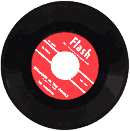 If you're of a certain age and lived in the Philadelphia area, you'll know exactly who Jerry Blavat is. The self-styled 'Geator With The Heater' and 'Boss With The Hot Sauce' has been rockin' Philly for decades. His music career began at age 13 when he appeared on the original (pre-Dick Clark) Bandstand televised dance show. Later he became a radio DJ, television host and dance party platter spinner. If you're of a certain age and lived in the Philadelphia area, you'll know exactly who Jerry Blavat is. The self-styled 'Geator With The Heater' and 'Boss With The Hot Sauce' has been rockin' Philly for decades. His music career began at age 13 when he appeared on the original (pre-Dick Clark) Bandstand televised dance show. Later he became a radio DJ, television host and dance party platter spinner.
Blavat is an acquired taste - a self-promoting, name-dropping, almost-famous egomaniac with a lot of connections to the Philly mob, although he protests that all were "just friends." Nevertheless, he spins a lot of entertaining stories of his encounters with Dick Clark, Walter Annenberg, Cardinal Kroll, Frank Sinatra, Sammy Davis, Jr. (the Geator claims to have been in the room when Sammy took his last breath) and others. This autobiography gives an insider's look at history of rock & roll in Philadelphia. Those stories brought back a lot of memories for me. I also learned a lot from the book and was particularly surprised to read about the vicious animosity fellow DJ Hy Lit had for Jerry.
At age 73, Jerry Blavat is still spinning records at casinos and clubs in the Delaware Valley. If you're ever in the area, you can catch his act.
I enjoyed 'You Only Rock Once'. If you grew up in Philly and/or are interested in rock and roll history, this makes for a good read. Rock on, Jerry. (posted 2/5/14, permalink)
'Furious Cool: Richard Pryor and the World That Made Him' by David Henry and Joe Henry
On his best days, Richard Pryor was a very funny guy spouting fairly original material. On other days, he was a woeful drug addict who regularly beat his women. Authors and fanboys David and Joe Henry have tried to make sense of it all - probably an impossible task. Pryor was just plain crazy. Does alleged 'comedic genius' excuse reprehensible behavior? Richard thought it not only did but gave him wholesale license. One finds neither redemption nor heros in this book. Just Richard Pryor and his victims.
Fellow comedian Franklyn Ajaye summed up Richard Pryor best: "I could learn from how he did his comedy but I didn't see anything about how he lived his life that I wanted to emulate. Zero. He was very tempestuous. I didn't even like to be around him. I don't like being around volatile people. ... He was just a troubled man. He was heavy into drugs, heavy into alcohol - who's sane doing that?"
Verdict: Don't bother. (posted 1/31/14, permalink)
'Cross My Heart' by James Patterson
I read a lot of fiction but rarely write reviews. I'm making an exception for this book .. because you need to be warned.
This author is largely known for his novels about black psychologist/detective Alex Cross. I've read most of them. This Alex Cross book moved along at an interesting pace and then ... just stopped. In the middle of the story. And left the reader hanging. If you want to know the ending ... you'll have to wait until the next Cross book comes out in 2015. Or '16.
I felt ripped off by this unfinished story. Screw James Patterson. I'm never reading another book by this author. Ever. (posted 1/27/14, permalink)
'Street Smarts: Adventures on the Road and in the Markets' by Jim Rogers
Financial expert Rogers cofounded the Quantum Fund, a hedge fund, and retired at age thirty-seven after making a boatload of money. He now believes that the U.S. is doomed and has relocated with his family to Singapore. While I agree that our national debt is waaaay too high and Bernacke's ultra-low interest rates are unsustainable, I am unconvinced that we're at the 'hoard gold, print militia money' stage.
The demise of America has been predicted by many: when Nixon went off the gold standard, when '70s hyper-inflation became the norm for a while, and in the Carter-era, when the dollar became a battered currency. I've posted some of the past expert bad predictions here. Somehow we've managed to survive and prosper despite setbacks.
Rogers offered some surprising observations on how the world works. I'm not sure I agree with everything he espouses but his ideas make for an interesting read and he offers his reasons, so the reader can draw his/her own conclusions. There's way too much boasting how others are wrong and the author often comes off as arrogant. Rogers loves to relate how rich and smart he is and what a swell life he and his family have in the Republic of Singapore. I would rather have received more specific investment advice.
For a more optimistic look about the future of America (thanks to the continuing revolution in technology), read 'Makers: The New Industrial Revolution' by Chris Anderson. Or 'Abundance - the Future is Better Than You Think' by Peter Diamandis and Steven Kotler. Or 'An Empire of Wealth: The Epic History of American Economic Power' by John Steele Gordon. (posted 1/23/14, permalink)

'Duke: A Life of Duke Ellington' by Terry Teachout
 Terry Teachout is a well-known and respected music critic and author. His biography of Louis Armstrong was well-written and informative. The author's latest biography is of musical legend Duke Ellington and it, too, is a worthy work. Terry Teachout is a well-known and respected music critic and author. His biography of Louis Armstrong was well-written and informative. The author's latest biography is of musical legend Duke Ellington and it, too, is a worthy work.
Ellington was probably the greatest jazz composer of the twentieth century, although he hated to hear his music described as 'jazz'. The Duke was a very talented but enigmatic personality. Teachout wrote that, even to his own band members, Ellington "was a riddle without an answer, an unknowable man who hid behind a high wall of ornate utterances and flowery compliments that grew higher as he grew older."
Pampered by his parents while growing up in Washington, D.C., Ellington began taking piano lessons at age seven from the improbably-named Marietta Clinkscales. He later dropped out of school to pursue his passion of music.
Teachout peeled away the many layers of Ellington's well-crafted evasions and public deception to reveal the truth about the man and his music. He documented Duke's musical thefts, his abusive denial of credit to the brilliant-but-troubled composer Billy Strayhorn and exposed Ellington's manipulation of others for his own needs. (Strayhorn is the compositional and arrangement genius behind many of Ellington's best-known songs - 'Take the A Train', 'C-Jam Blues' and 'Satin Doll'. Strayhorn is said to have written both the music and lyrics to 'Lush Life' when he was a mere teenager.)
Admired by many, close to few, Ellington was at heart a lonely man who tried to run away from his troubles by relentlessly playing gigs on the road. While Duke Ellington was friendly toward Louis Armstrong in public, privately he berated Armstrongs's showmanship as clownish and felt that Louis did not projecting a positive image of blacks. Ellington was very careful in his dress, manners as well as erudition and was a master of affectation - all in an attempt to present himself as upper class. He claimed to be versed in subjects like classical music, which he was not - making him somewhat of a poseur.
Readers will learn that there is much more to the suave Mr. Ellington than 'Take the A Train' and 'Mood Indigo'. This is an excellent, thorough book which will engage readers and maintain the interest of musicians and non-musicians alike. Highly recommended. (posted 1/15/14, permalink)
'Implosion: The End of Russia and What It Means for America' by Ilan Berman
The media has us believe that Russia is on the rebound under the guidance of poses-shirtless-with-tigers Vladimir Putin. Author Berman says that Russia is in fact dying - afflicted by economic stagnation, widespread corruption, a shrinking birthrate, the collapse of the Russian family, widespread alcohol and drug addiction and an escalating AIDS epidemic.
Russia's Slavic population is constricting while its troublesome Muslim population is expanding. Muslims now account for 15% of Russia's population. Continuing conflicts with China only add to the country's problems. Such difficulties are compounded by legal and illegal migration of Chinese into far-eastern Russia.
The collapse of Russia could pose a grave danger to America's security as well as global stability.
This book is information-packed but be warned - it is smaller than you might think. More than half the book is devoted to notes, appendices and an index.
Verdict: Recommended. (posted 1/9/14, permalink)
'Wealth And Poverty: A New Edition For The 21st Century' by George Gilder
First published in 1981, this book spread the gospel of supply-side economics to a broad audience. It sold over a million copies. I missed it the first time around but an updated version was released in 2012.
The book has three central premises:
• Wealth is created by enterprising individuals, fostered by nations without cumbersome tax/regulatory burdens.
• The way out of poverty involves work, family and faith. Poverty is not determined by race. Poverty is enabled and institutionalized by government assistance programs.
• Entrepreneurs and smaller companies are the keys to innovation and job-creation.
While the assertions and conclusions are as valid today as they were in 1981, the data presented are old, dating back to the 1970s. Some of Gilder's assertions are unsupported. Nevertheless, 'Wealth And Poverty' made for an interesting read. Recommended. (posted 1/3/14, permalink)
More book reviews are posted here.
copyright 2014 - Joseph M. Sherlock - All applicable rights reserved
Disclaimer
The facts presented in this blog are based on my best guesses and my substantially faulty geezer memory. The opinions expressed herein are strictly those of the author and are protected by the U.S. Constitution. Probably.
Spelling, punctuation and syntax errors are cheerfully repaired when I find them; grudgingly fixed when you do.
If I have slandered any brands of automobiles, either expressly or inadvertently, they're most likely crap cars and deserve it. Automobile manufacturers should be aware that they always have the option of trying to change my mind by providing me with vehicles to test drive.
If I have slandered any people or corporations in this blog, either expressly or inadvertently, they should buy me strong drinks (and an expensive meal) and try to prove to me that they're not the jerks I've portrayed them to be. If you're buying, I'm willing to listen.
Don't be shy - try a bribe. It might help.
|
|

